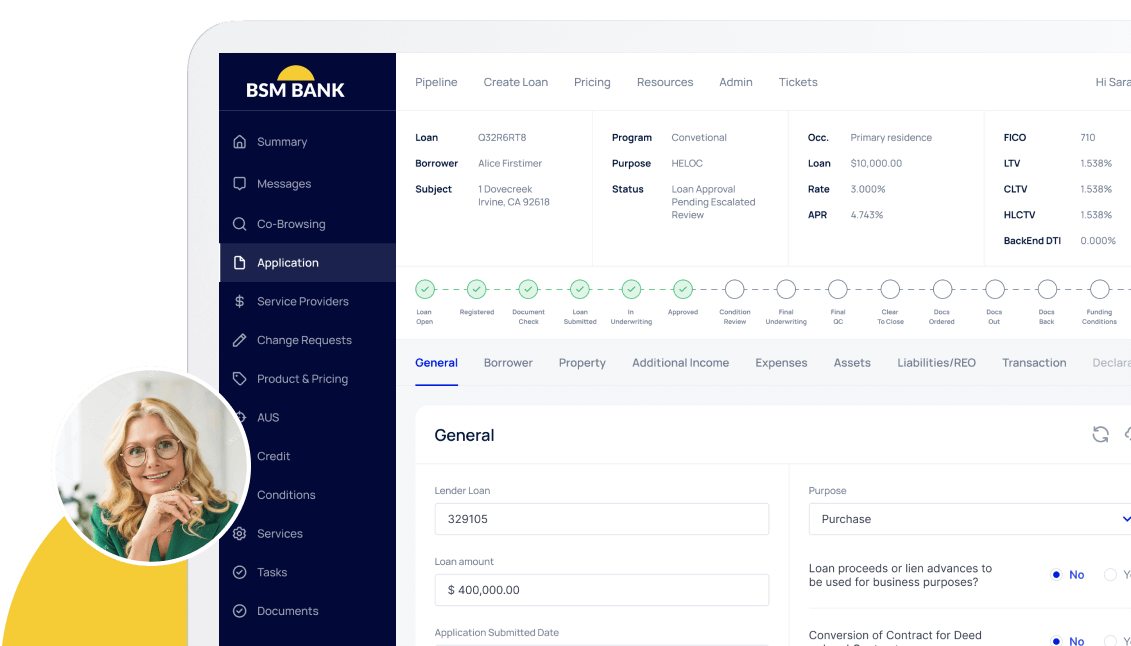The world of mortgage lending has witnessed a remarkable transformation in recent years, with the advent of digital mortgage lending taking center stage. On average, annual spending on loan-origination software by lenders has increased slowly but steadily by 2.5% in the past five years, according to research from McKinsey & Company.
As technology continues to advance at an unprecedented rate, the future of digital mortgage lending promises to be even more dynamic and customer-centric. In this blog post, we will explore the key innovations and trends that are reshaping the landscape of digital mortgage lending.
Table of Contents
The Digital Mortgage Revolution
Digital mortgage lending represents a significant departure from traditional lending processes. It leverages technology to streamline every aspect of the mortgage journey, from application to closing, making it faster, more efficient and customer-friendly.
Key Benefits of Digital Mortgage Lending
Before we dive into the innovations, let’s briefly revisit the benefits of digital mortgage lending:
1. Speed
Digital mortgages significantly reduce processing times, enabling borrowers to secure financing more quickly.
2. Convenience
Borrowers can apply for mortgages from the comfort of their homes, eliminating the need for in-person visits to banks or mortgage brokers.
3. Accuracy
Automation reduces the risk of errors in document preparation and data entry, leading to more accurate loan applications.
4. Cost Savings
Lenders can reduce operational costs associated with manual processes, which can translate into cost savings for borrowers.
5. Transparency
Digital platforms provide borrowers with real-time updates on the status of their applications, enhancing transparency.
Innovations Shaping the Future of Digital Mortgage Lending

Artificial Intelligence (AI) and Machine Learning
AI and machine learning are poised to play a pivotal role in the future of digital mortgage lending. These technologies can analyze vast datasets to make more accurate lending decisions, assess risk and personalize loan offers. Chatbots powered by AI are also being used to answer borrower queries and guide them through the application process, enhancing the overall customer experience.
Blockchain Technology
Blockchain’s distributed ledger technology is gaining traction in the mortgage industry due to its potential to enhance security and transparency. It can streamline the verification of property titles, reduce fraud and expedite the closing process. Smart contracts on blockchain can automate various stages of mortgage transactions, reducing the need for intermediaries and minimizing delays.
Biometric Authentication
Digital mortgage lenders are increasingly adopting biometric authentication methods such as fingerprint recognition, facial recognition and voice recognition. These technologies enhance security and simplify the identity verification process, making it more convenient for borrowers.
Robotic Process Automation (RPA)
RPA is being utilized to automate repetitive and rule-based tasks within the mortgage lending process. This includes data entry, document processing and compliance checks. By automating these tasks, lenders can reduce processing times and free up their staff to focus on more complex tasks and customer service.
Subscribe to BeSmartee 's Digital Mortgage Blog to receive:
- Mortgage Industry Insights
- Security & Compliance Updates
- Q&A's Featuring Mortgage & Technology Experts
Mobile Mortgage Applications
Mobile apps are becoming a central component of digital mortgage lending. Borrowers can complete the entire mortgage application process, including uploading documents and e-signing, directly from their smartphones. This level of convenience is reshaping borrower expectations and driving the demand for mobile-friendly solutions.
Predictive Analytics
Predictive analytics tools are helping lenders assess borrower creditworthiness more accurately. By analyzing a wide range of data points, including non-traditional sources such as social media activity and rent payments, lenders can make more informed lending decisions and offer tailored loan products.
Collaborative Ecosystems
The future of digital mortgage lending is likely to involve collaborative ecosystems where various stakeholders, including lenders, real estate agents, title companies and appraisers, work together seamlessly. Digital platforms that facilitate communication and data sharing among these parties can reduce bottlenecks and accelerate the closing process.

Challenges and Considerations
While the future of digital mortgage lending is promising, it also presents some challenges and considerations:
1. Cybersecurity
As digital mortgage platforms handle sensitive financial and personal data, robust cybersecurity measures are essential to protect against data breaches and cyberattacks.
2. Regulatory Compliance
Mortgage lending is subject to a complex web of regulations. Digital lenders must navigate these regulations to ensure compliance and avoid legal issues.
3. Data Privacy
Borrowers are increasingly concerned about the privacy of their data. Lenders must prioritize data protection and transparency in their digital processes.
4. Education
Borrowers may need assistance in navigating digital mortgage platforms, especially if they are not tech-savvy. Lenders must provide educational resources and support.
Roundup
The future of digital mortgage lending is poised to be marked by innovation, efficiency and enhanced customer experiences. From the integration of AI and blockchain to the widespread use of mobile applications and biometric authentication, the digital mortgage landscape is evolving rapidly.
For lenders and borrowers alike, the future promises faster loan approvals, reduced paperwork and a more streamlined mortgage process. However, it’s important to approach these innovations with a focus on cybersecurity, regulatory compliance and data privacy to ensure a secure and trustworthy digital lending environment.
As technology continues to advance, digital mortgage lending will remain a dynamic and evolving field, reshaping the way we buy and finance homes. Embracing these innovations is not just a competitive advantage; it’s a necessity in the modern mortgage industry. Contact us today to learn about the latest digital mortgage innovations.




